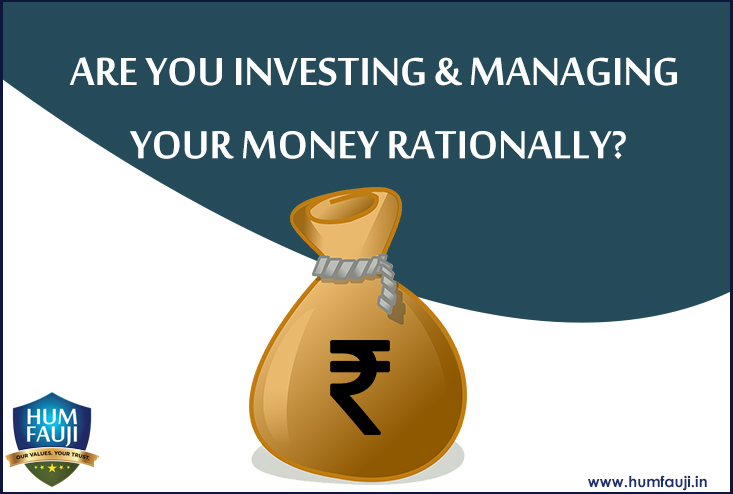Errors Investors Repeatedly Make in Choice of Investment and Timing
Behavioural Finance is a very interesting field of psychology. It studies and analyses the reaction of people and their bias when faced with investment decisions. Please read the instances given below – do you relate yourself to any one or more of them?
You have your investments in various stock-related instruments – equity and equity-diversified mutual funds. Some of these are in profit while some are in loss currently. You need some money urgently. You sell the profit making ones.
- Effectively you have sold the ones doing well since you keep hoping that you will ‘recover back your loss’! This explains why people realize the gains of winning stocks too soon. The flip side of the coin is people hold on to losing stocks for too long; unfortunately, many of the losing stocks never recover, and the losses incurred continued to mount, with often disastrous results.
You have some money to invest. You can either invest it in Real-estate where it is likely to double, or in equity-diversified mutual funds which will give you 15% returns per annum over a period of Five years. You go ahead and invest in real-estate since it looks like a better deal.
- Actually both returns are the very same – only money seen in bulk rather than in percentage terms ‘seems’ a better deal. As such, real-estate being a physical, ‘holdable’ investment, gives more comfort than a paper investment even though, compared to stocks or mutual funds, it has a lot of hassles!
Question 1 – You have Rs 1 lakhs and you must pick one of the following choices:
Choice A: You have a 50% chance of gaining Rs 1 lakhs and a 50% chance of gaining nothing.
Choice B: You have a 100% chance of gaining Rs 50,000.
Question 2 – You have Rs 2 lakhs and you must pick one of the following choices:
Choice A: You have a 50% chance of losing Rs 1 lakhs and 50% of losing nothing.
Choice B: You have a 100% chance of losing Rs 50,000.
Take your pick of the two questions above
Majority of people choose “B” for question 1 and “A” for question 2. People are willing to settle for a reasonable level of gains (even if they have a reasonable chance of earning more), but are willing to engage in risk-seeking behaviour where they can limit their losses. In other words, losses are weighted more heavily than an equivalent amount of gains.
You’re shopping for cars and you’re down to a final choice between a Honda City and Verna. Both have distinct advantages and you finally choose one model. Next time, if you have to buy a car or to recommend one to somebody else, you recommend the same model that you have bought.
- You will remember the advantages of the alternative you selected and not the advantages of the one you didn’t choose. This bias affects future buying decisions, which is why we often get into a “rut” of buying the same product type over and over again. When we go to make a selection, it is much easier to recall the positive attributes of the product we purchased rather than the product we didn’t purchase. Same bias is reflected in investment decisions too – a person investing in Provident Fund or another one in stocks will continue to do so without doing a fresh review for every purchase.
You find that the stock of a company, which you believed to be good, has fallen considerably in a very short amount of time. You go ahead and purchase a large amount of it believing that the drop in price provides an opportunity to buy the stock at a discount, without conducting any further research.
- It is true that the fickleness of the overall market can cause some stocks to drop substantially in value, allowing people to take advantage of this short- term volatility. However, stocks quite often also decline in value due to changes in their underlying fundamentals. For instance, suppose XYZ stock had very strong revenue last year, causing its share price to shoot up from Rs 25 to Rs 80. Unfortunately, one of the company’s major customers, who contributed to 50% of XYZ’s revenue, decided not to renew its purchasing agreement with XYZ. This change of events causes a drop in XYZ’s share price from Rs 80 to Rs 40. Investor erroneously believes that XYZ is undervalued. Keep in mind that XYZ is not being sold at a discount; instead the drop in share value is attributed to a change to XYZ’s fundamentals (loss of revenue from a big customer).
Some other documented Investor Behaviour
- People are often impatient to sell a good stock.
- People often make a distinction between money easily made from investments, savings or tax refunds and their ‘hard-earned’ salary – money‘easily’ earned is more readily spent or wasted.
- People feel the loss of a Rupee to a far greater extent than they enjoy gaining a Rupee.
- Investment in stocks and mutual funds are often thought of as pieces of paper rather than as part ownership of a company. That’s why investments in Gold and real-estate (the physical investments) are always valued more than paper investments.
- People tend to think in extremes – the highly probable news is considered certain, while the improbable is considered impossible.
- People often take a short-term viewpoint. Recent market losses lead to suspicion and caution, while recent gains lead to action. Long-term losses or gains get forgotten, even if they are of a greater magnitude.
- Most people will avoid risk when there is the chance of a certain gain. But faced with a certain loss, they become big risk takers.
- People often assume that lack of market or price movement represents stability, while volatility represents instability.
- People follow the crowd, and are heavily influenced by other people or compelling news; they fail to check out the real facts themselves.
Visit our Blog, humfauji.in/blog or facebook page http://www.facebook.com/HumFaujiInitiatives to get latest insight on matters financial
With regards,
Col (retd) Sanjeev Govila, CERTIFIED FINANCIAL PLANNERCM,
CEO, Hum Fauji Initiatives,
Your long-term partner for wealth creation
9999 022 033, 011 – 4054 5977 (Off), humfauji.in













Leave a Reply